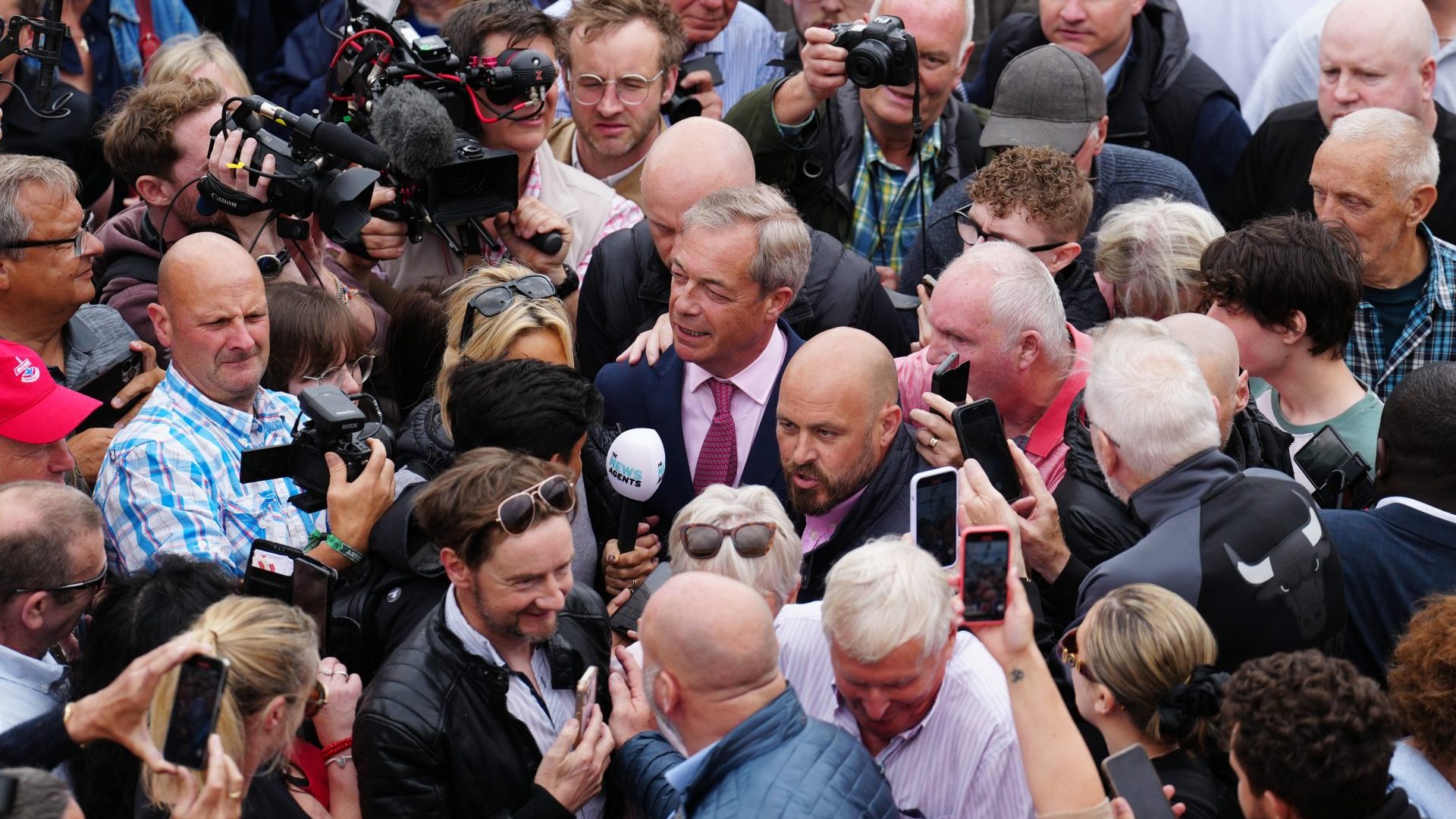Last time Britain went to the polls, Nigel Farage was leader of the Brexit party, the organisation that had emerged from the ruins of UKIP, and he wanted to make an electoral pact with Boris Johnson to make sure that we left the EU.
Johnson said no dice – but his tabloid groupies were worried that there were too many Remainers out there. They began to worry that, if the Brexit party stood in 500-odd seats as planned, there was a risk of a split developing on the right. That risked opening the door to a Corbyn government, but also the nightmare possibility of a surge in LibDem support, leading to a second referendum.
“Stand aside Nigel” begged the Mail, which encouraged voters to write to the Brexit party, urging them not to put up candidates in marginal seats where they might hit the Tory vote. He must search his conscience and stand down his troops, the article said – if he wrecked Johnson’s chances, his life’s work would have been for nothing. The Express agreed. Farage’s place in history was assured as a brave and visionary Briton who had inspired millions to throw off the shackles that bound our nation to Brussels. But now his time was up.
Farage obliged. He pulled back candidates in Tory-held seats and Johnson duly won his landslide. It turned out there was never a real danger of our “getting Corbyn”. We left the EU, Brexit has been a disaster, immigration – Farage’s abiding concern – has soared, and he has spent the past five years bitching about betrayal.
Now, after flirting with a broadcasting career and the lure of joining the Trump legions across the pond, he’s back, having seized the leadership of UKIP’s latest incarnation, the Reform party, which unusually for a political party is structured as a limited company, with Farage as the main shareholder.
And he’s going to stand, for the eighth time, as a parliamentary candidate, this time in the very winnable seat of Clacton, in Essex. He had said only last week that he would not seek election, but he’d changed his mind – which he said you’re allowed to do (someone please tell the Tories and their press supporters reaching for yet another “Sir Flip Flop” jibe). As he launched his campaign, Farage told the crowd that he couldn’t let down his millions of supporters by not standing – yes, he really said millions – and that if he didn’t run for parliament, he’d feel guilty.
This time he is not on a rescue mission, but a wrecking mission. He doesn’t want partnership with the Conservative party, he wants to destroy it. Or weaken it to the point where he can take it over.
Our media have never been able to resist Farage: all those appearances on Question Time, oceans of printed news space over the years, his every utterance faithfully recorded by the Richard Desmond-owned Express, which allowed him to tell readers why they MUST vote UKIP in 2015 to “keep Britain great”. The Mail was far more concerned with rubbishing Red Ed and the SNP, noticing Farage only when he made a homophobic joke in his best man speech at his brother’s wedding.
The Times had even made him its man of the year in 2014 – albeit with the air of someone holding their nose – and had described him as a game-changing politician. The paper thought then that there was a chance that UKIP could hold the balance of power after the upcoming election – or, equally, that it might split the Tory vote and so scupper Farage’s hopes for an EU referendum. The editorial seemed to think the latter was more likely, concluding that the SNP might elbow him out of the limelight, leaving him to spend more time in the pub. But the paper concluded that no one had done more to shape politics in 2014, so “for good or ill,” he was the Times Briton of the year.
Today, the Times still sees him as a “consequential” politician, a “formidable and feared campaigner”, while noting that he is capricious and suggesting that his decision to stand for election in the UK could be due to some knockback from America. The editorial rejects as unlikely the idea that, as his party’s sole MP, Farage could become the focus for bruised rightwing Tory backbenchers in search of a saviour, even though rumours about Tory defections to Reform started soon after Farage announced he was running. But still, the Times recognises his power to shape events, and laments: “If only the peerage reportedly offered him by Boris Johnson in 2019 had become a reality.”
The Times does not seem particularly alarmed by what others see as an existential threat to the Tory party: “once the most successful and durable political force in the western world”. But that’s probably because the Times, like Farage, is convinced that the successful and durable Tories are about to take an almighty drubbing. But, unlike Farage, the paper believes that the party will rebuild itself.
The Mail and Express, however, are still clinging to the notion that Sunak can somehow keep hold of the keys to No 10 and that Farage should be careful what he wishes for. Again invoking the threat to his “life’s work”, the Mail says that Reform splitting the Tory vote makes a Labour landslide more likely. Starmer, the editorial continues, is a committed Remainer. Once in power, how long will it be before free movement and the customs union are back on the table? Having been such a trailblazer for Brexit, it would be a tragedy if Farage became the catalyst for its demise. We can but hope.
So while the Times watches on almost disinterestedly as the house starts falling in, the Express and Mail are charging round desperately mounting arguments in an attempt to hold it all together. And the Telegraph? Long disenchanted with Sunak’s Tory party, it has quietly been chipping at the foundations for a while and is today hugely excited by the prospect of tearing the whole place down and rebuilding from scratch.
The election is lost, Matthew Goodwin wrote on the Telegraph’s website, and Sherelle Jacobs made the same point in print. Jacobs sets out a forlorn picture of a country under Starmer, with a war on the middle classes and outrageous policies that ignore the fact that “Britain is flat broke and lacks the scale, currency strength, infrastructure and sheer resources to waste on green industrial ventures”. Which may be true – but who exactly has been presiding over this state of affairs for the past 14 years?
Goodwin’s column is ecstatic, calling his decision to run “Farage’s finest hour”. The Tories had “actively encouraged” our national decline, he writes, and must lose this election – and heavily. They “must not be allowed to continue in their current form – a lifeless, pointless, shapeless, intellectually vacuous party that at each and every turn has put its own interests ahead of those of the country. They simply have to become something else.”
In Goodwin’s view, at least, it seems that Farage is the only person who can pull off this great act of reinvention. The current model of conservatism must be destroyed. It will be the culmination of his entire life and his legacy.
Elsewhere on the Telegraph website, Douglas Carswell, the Tory-to-UKIP defector who was for years the custodian of the Clacton seat, has some local advice for his former party leader – share jam recipes. In print, Farage himself has space to set out his store on how he is going to lead the revolution.
He has been on those opinion pages before, the same pages that once played host to Boris Johnson. Whether or not he secures that foothold in Westminster, Farage is unlikely to be a stranger to them in the future. Just as in the old “Boris Monday” days, we can expect many a splash on his great thoughts, especially if Paul Marshall, his current boss at GB News, is able to secure the takeover of the Telegraph titles.
Farage is back – if he ever went away. He thinks he can take Britain where Orban has taken Hungary, that he can spearhead a great populist movement across the country. He won’t make Britain great again, any more than he will help Trump make America great again. But he’ll have platforms aplenty to spout his dubious anti-immigrant, anti-Islam rants (the Guardian did a fact check on his launch speech yesterday and found five distinctly questionable soundbites). And in the meantime, Sunak’s Tories will lurch further and further to the right with ever more inhumane policies to try to stop him.
Farage doesn’t represent the silent majority. He doesn’t speak for “millions” of people who find themselves without a political voice – the milkshake in the face might have woken him up to the limits of his popularity. He’s right that the country is crying out for change. But that doesn’t mean that it wants his type of change. One day, the rightwing papers might realise this. Though clearly that is some way off. You had to turn to page 6 of the Telegraph before finding the story: “Labour set for victory that would outshine Blair landslide”. Meanwhile the two big stories on the front page were of Farage “leading the revolt” and Sunak planning a cap on migration. What? Neither is going to be in power a month from now. Neither is going to happen.
For that, at least, we should be grateful.












